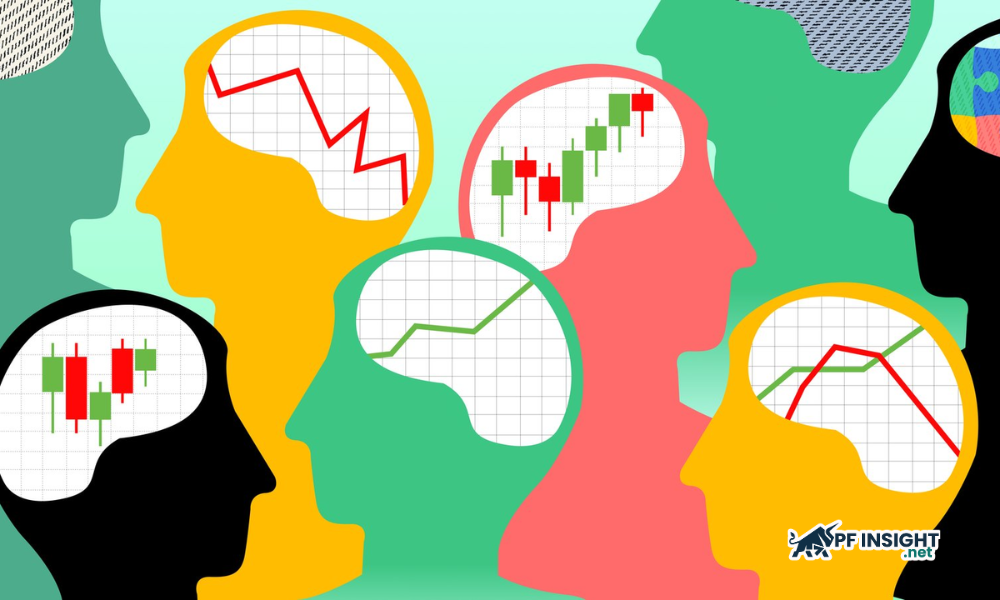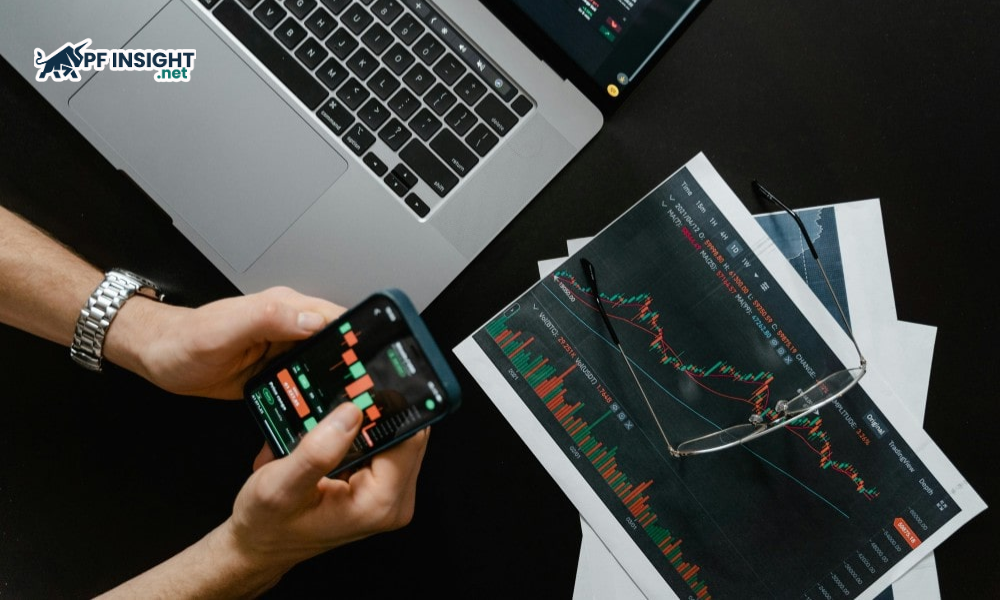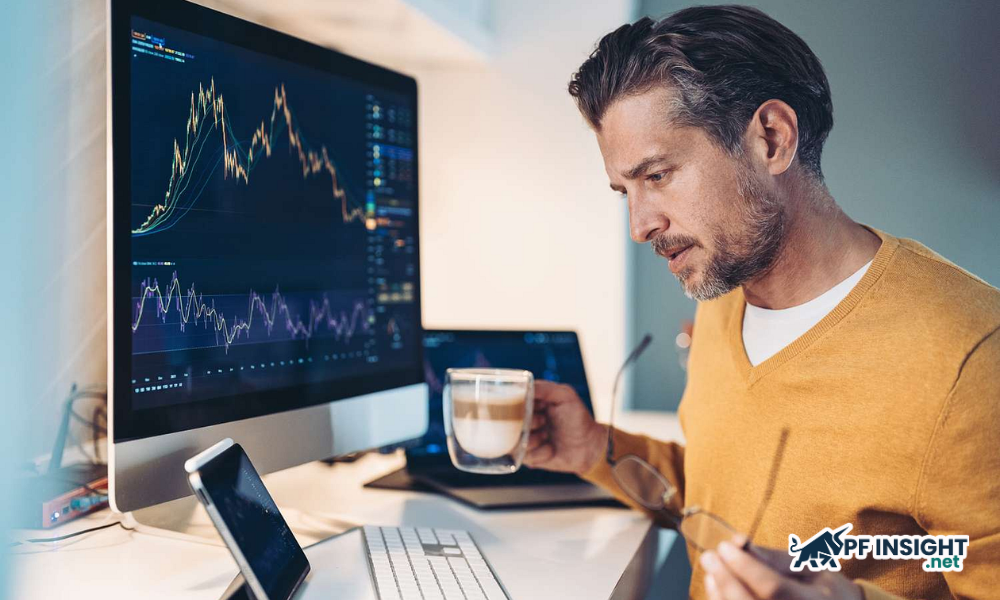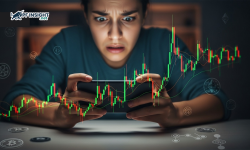The market is always volatile and success in prop trading requires not only analytical skills but also the ability to manage emotions, maintain consistency and turn challenges into opportunities. Prop trading psychology forms a solid foundation, on which discipline helps control impulses and patience helps overcome fear. This article from PF Insight will help you analyze how to handle losses, maintain focus and improve trading performance.
What is trading psychology?
Trading psychology studies how emotions and mental states influence a trader’s decisions, which in turn influence trading results. It is a factor related to personality, habits, and behavioral responses in market situations. In trading psychology, discipline and risk tolerance are considered the foundations that determine the success of a strategy. Traders can maintain consistency and avoid making hasty decisions when they have good control over these two factors. On the contrary, fear, greed, hope, and regret will affect trading behavior and results in the market.
Factors affecting the prop trading psychology
Prop trading environment has its own unique characteristics such as higher performance and stricter discipline. This difference creates great psychological pressure, forcing traders to practice emotional control and maintain focus. Here are the factors that affect prop trading psychology:

Transactions using fixed capital
While there are many benefits to having access to and using large amounts of capital in proprietary trading, there are also certain psychological pressures. The responsibility to be efficient and minimize losses becomes a mental pressure for traders who manage other people’s money. This can lead to negative reactions such as excessive risk avoidance, or conversely, overtrading, which reduces performance.
Trading expectations and performance goals
In order to maintain access to capital and career advancement opportunities, traders at proprietary trading firms are often required to meet specific performance targets. While these targets are intended to increase productivity, they can sometimes become a source of great pressure. Many traders may make irrational decisions due to prop trading psychology traps caused by the fear of not meeting expectations. In an effort to quickly reach their profit target, they may try to “recoup losses” through revenge trading or take on higher-than-normal risks, which can negatively impact their long-term performance.
Monitor and evaluate performance
Firms often closely monitor traders in proprietary trading environments to ensure performance. This constant monitoring can increase their mental stress, sometimes causing them to feel harshly judged and controlled. Excessive monitoring pressure can quickly cause traders to lose focus, making it difficult to maintain discipline and successfully implement trading strategies.
Market volatility and risk
The volatile and unpredictable nature of financial markets makes it difficult for proprietary traders to operate. In addition to monitoring the capital entrusted to them, they must also ensure that performance targets are met. Prop trading psychology is susceptible to sudden market changes, which can lead to panic, fear, or greed. These emotional reactions can impair analytical abilities, causing traders to make rash, illogical choices and become vulnerable to losses.
Isolation in the trading environment
Trading is a highly personal activity, and sole traders often operate in isolation, especially when trading remotely or online. Feelings of loneliness and lack of shared experiences can result from prolonged isolation. This makes it more difficult to control emotions and overcome psychological stress.
Psychological challenges in proprietary trading
Many prop trading psychology obstacles have a direct impact on traders’ performance, making it difficult for them to maintain consistency in trading and limiting their ability to achieve sustainable success in the markets. Specifically:

Fear and Greed in trading
These two trading psychology props have a significant impact on trading behavior and often lead to illogical choices. Fear can cause traders to hesitate to seize good opportunities or exit profitable trades too early. On the other hand, greed can easily create blind confidence, promote taking risks beyond their capabilities and cause traders to break their discipline and trading plan.
FOMO (fear of missing out)
Traders tend to make hasty trading decisions driven by FOMO rather than careful analysis as they are constantly eager to enter the market or try to take advantage of every opportunity. Furthermore, many lack the patience to wait for high-quality signals. As a result, they often force themselves into trades that do not fit their strategy, reducing their performance and increasing unnecessary risk.
Revenge psychology in trading
Many traders are tempted to open more positions after suffering a loss in the hope of quickly recovering the lost money. With higher than normal trading volumes and less logical analysis, this behavior is often impulsive. This is known as “revenge trading”, a prop trading psychology response that often leads to unfavorable results, making losses worse.
Arrogance and self-confidence
A string of profitable trades can quickly turn traders into cocky and selfish traders. They often ignore risk management principles and take larger positions than necessary even though they always think they are right. This complacency can increase the risk of significant losses and wipe out any previous profits.
Analysis overload
Overthinking and over-analyzing can sometimes put traders in a difficult position and prevent them from making timely decisions. When the fear of making mistakes prevails, they easily miss out on potential trade setups that are clearly identified. This hesitation not only causes missed opportunities but also negatively affects their efficiency and ability to maintain consistent profits.
Loss of control and indecisiveness
To achieve long-term success in trading, consistency and discipline are essential. However, traders often break the rules, make impulsive trades and ignore risk management guidelines due to the pressure of prop trading psychology. In addition to reducing trading efficiency, this irregularity also increases the chance of losing money.
Mental stress and fatigue
Traders can suffer from chronic stress and fatigue due to the constant pressure they face in proprietary trading. When stress becomes chronic, it not only impairs their ability to think rationally and regulate emotions, but also affects their overall health. As a result, trading performance declines and trading careers are seriously threatened.
How to control psychology successfully in proprietary trading
Controlling prop trading psychology is a long-term process, not a quick fix. The following basic techniques can have a big impact on traders’ trading results if they want to maintain consistent performance and cultivate a winning mindset.

Plan your trading closely
For traders to maintain a stable prop trading psychology in a volatile environment, a thorough trading plan is an important starting point. Clear profit targets and loss limits, an overall trading strategy, risk management guidelines, and precise terms for entering and exiting trades are all part of the plan. Traders with a clear strategy will be able to control impulses, prevent emotions from taking over, and make more rational and methodical choices throughout the process.
Effective risk control
In addition to being a cornerstone of capital protection, effective risk management also supports a stable prop trading psychology. Traders can be less anxious about market fluctuations and more confident knowing that risk is minimal. Losses are managed, performance can be maintained, and long-term sustainability can be improved by using strategies such as stop losses, portfolio diversification, and appropriate position sizing.
Master your emotions
In prop trading psychology, the use of relaxation techniques such as deep breathing and meditation can help traders become more emotionally self-aware and maintain a balanced state. Calmness is essential to making informed decisions in a volatile market, and this can be achieved by recognizing stressors early and developing self-control over impulsive reactions.
Track your trades and self-assess
One effective strategy for traders to strengthen their mental and mental health is to keep a trading journal. Keeping a detailed record of each trade will help them gain a better understanding of their individual behavior, including the reasons for placing the trade, their emotional state, and the results. Regular reviews help traders easily identify bad habits, common mistakes, and areas for improvement to improve their long-term trading performance.
Learn from experts and the community
Connecting with experienced traders or seeking professional mentorship is extremely beneficial for the development of prop trading psychology. You can receive timely guidance, encouragement and effective emotional management techniques by sharing your worries, obstacles and pressures in the process of trading yourself with someone who has gone through it. Additionally, being part of a trading community gives you a sense of belonging, allows you to absorb knowledge from the real-life experiences of others and stay motivated over time.
Prioritize process over results
Traders need to shift their focus from the end result to the trading process itself to develop prop trading psychology. They should carefully follow their trading plan, risk management principles, and make decisions based on objective analysis instead of obsessing over profits or losses. This strategy encourages consistent behavior and minimizes emotional reactions to temporary market fluctuations. In the challenging world of proprietary trading, traders can build a solid foundation for long-term success by maintaining discipline and consistency, which helps them build mental resilience and stay calm under market pressure.
Accept failure and learn continuously
Losses and mistakes are inevitable in trading. Traders can continually improve by adopting a mindset that views failure as a learning opportunity. Look at losing trades objectively, identify weaknesses, and adjust your approach as needed. Turn each failure into a learning opportunity for long-term growth rather than letting it affect your emotions or undermine your self-esteem.
Physical protection and mental balance
Traders’ physical and mental health improves when they maintain a healthy lifestyle. Important factors include a balanced diet, regular exercise, adequate sleep, and time for relaxation. To maintain consistent and long-term performance in the markets, traders who take care of their overall health are better able to think clearly, regulate their emotions, and respond more quickly to the demands of proprietary trading.
Improve patience and discipline
The key to successful trading is patience. Trading based on emotions or forcing trades should be avoided. Instead, traders should learn to wait for high probability signals. Even in volatile markets, discipline helps ensure that trading plans are consistently executed and risk management principles are followed. Traders can improve their long-term trading performance and make informed decisions by cultivating self-control and consistency.
Recognize small successes and aim for big goals
Throughout your trading journey, always pay attention to and celebrate small wins. Acknowledging these results will increase motivation, confidence, and reinforce positive habits. Prioritize sustainable growth, long-term progress, and laying the foundation for future trading success over chasing short-term gains.
Conclude
In a high-pressure environment, prop trading psychology serves as the foundation for turning analytical skills into sustainable profits. The ability to control emotions, maintain discipline, and make rational decisions is crucial to long-term success, although market knowledge and analytical skills are also important. Traders with a strong mindset can implement effective strategies and react flexibly to market changes.
The key to consistently making profits in proprietary trading is developing a winning mentality. Strong self-control, emotional control, resilience to failure, and a focus on the process rather than the end result are all components of this mindset. By actively engaging and addressing psychological issues, traders can adopt strategies that improve mental health, increase productivity, and reduce errors. The continuous process of developing psychological strength and self-awareness helps traders stay calm, make informed choices, and turn potential failures into learning lessons, laying the foundation for sustainable success in volatile markets.







